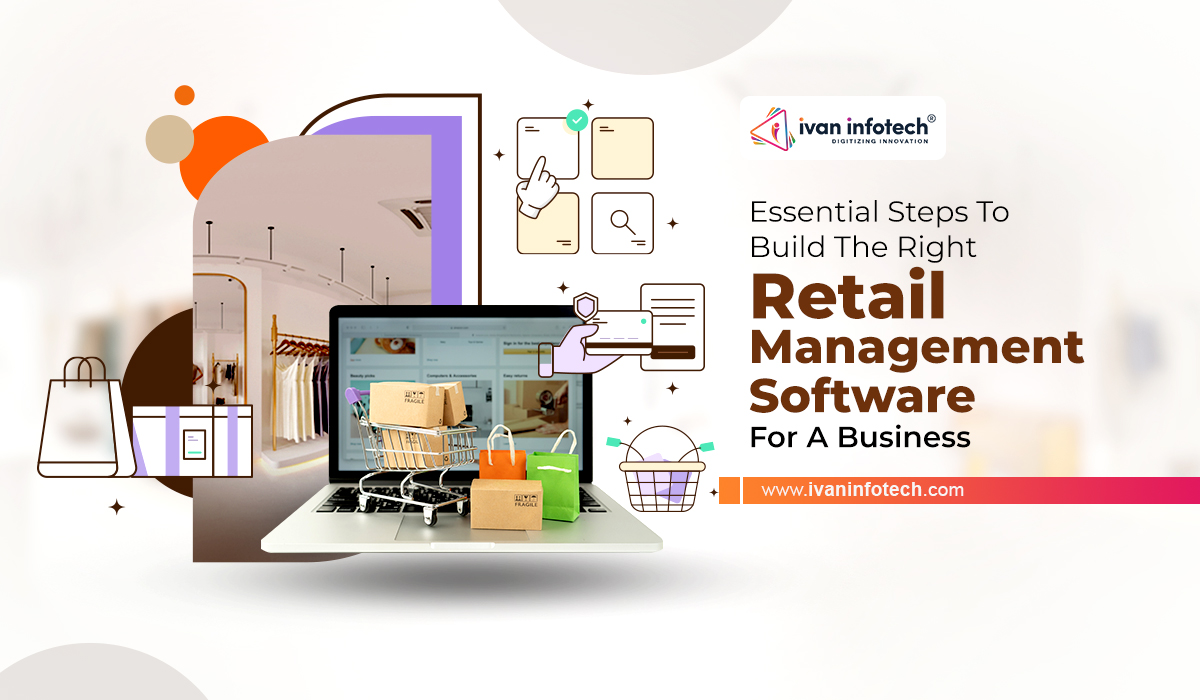
Steps To Build Retail Management Software
A successful business depends on having the correct software solution in the cutthroat retail environment of today. For the past few years, the retail industry just like any other sector has witnessed several major transformations. This new shift is mostly due to the adoption of new advanced technologies that have made the retail business better and highly effective in terms of operation. It has not only made the particular industry fast-paced but also highly competitive. These changes have accelerated the requirement for customised retail software solutions.
The development of retail software is essential for optimising processes, increasing effectiveness, and improving consumer experiences. But developing the ideal retail management software solution calls for thorough preparation and thought. One of the foremost factors as to why the retail industry has been heavily investing in software as a means of transformation is to fulfil the evolving requirements and expectations of its customers and also to remain ahead of the competitive edge.
In this blog post, we’ll look at the essential actions that may be taken to create a customised retail software development solution that meets your company’s objectives and promotes long-term success.
How To Build The Right Retail Management Software?
While there are numerous reasons for retailers to invest in retail management software, but to ensure that the software is the perfect one for the concerned business is the most essential part. Here is a list of key steps that determine the right process for choosing and building the ideal retail software for a business.
- Describe Your Business Goals And Requirements:
Defining your goals and needs is crucial before starting the development path. Identify the problems that your company is having and the areas where software can help. Think about elements like customer relationship management, analytics, point-of-sale systems, and inventory management. Identify the precise features and functionalities your software solution has to have in order to effectively fulfil these needs.
- Investigate The Options:
Secondly, always carry out an extensive study to find market-available retail management software options. Seek out service providers with a solid track record, satisfied clients, and a wide range of features. Consider their suitability for your company’s needs and how scalable they are to handle expansion in the future. Make a list of the potential software vendors that closely match your business requirements.
- Compare Between Off-The-Shelf And Customised Solutions:
Make sure to compare the benefits and drawbacks of customisation with the ready-made solutions before finalising on anything. With customised software, you may adapt features to your unique needs, thereby giving you more flexibility. However, the time and materials needed for development are often more. Although ready-made solutions enable quicker implementation, they could not fully satisfy your particular requirements. Achieve balance based on your financial constraints and company priorities.
- Collaborate With The Right Software Development Company:
Building a successful retail management software solution requires selecting the proper software development partner. Look for a development firm with a good reputation and retail software expertise. To define your vision, objectives, and requirements, work closely with them and gain insights if they would be able to deliver the requirement. A trustworthy partner will help you through the development process by offering helpful suggestions for improvements. To guarantee that the final solution meets your expectations, ensure to keep the lines of communication open always.
- Agile Development Techniques
For your retail software development, make sure to take into account an agile development process. The Agile method places a strong emphasis on continuous improvement and collaboration, which promotes adaptability and quick responses to changing requirements. The programme will adapt to meet your changing demands thanks to frequent testing and feedback cycles. This strategy helps you to prioritise features and swiftly provide a minimum viable product, giving your company real value.
- Monitoring And Testing For Quality
Last, but not the least, implement a thorough testing and quality assurance procedure to guarantee the dependability and efficiency of your retail software solution. Be mindful of testing the software’s features, usability, security, and compatibility with various hardware and software platforms in-depth. To get input from stakeholders and make the required adjustments before the official launch, make sure to run user acceptance testing.
Investing in software requires a lot of finances and therefore, every retail company opting for one must make sure to consider the right factors before committing to one. Planning carefully, doing research, working together, and testing are all necessary when developing the ideal retail management software development solution. You can construct a customised solution that caters to the particular requirements of your company by establishing your goals, looking into alternatives, and working with a software development partner. You may deliver a high-quality software solution by employing rigorous testing procedures and using strategic approaches. In creating the ideal retail software solution, keep in mind that you are investing in the long-term expansion and success of your company.
Subscribe to the Newsletter
Don’t lag behind in the ever-evolving age. Stay updated with all tech news and trends. We will not fill your inbox with spam mails. You will only receive updates about the cream contents.
Want Assistance with Software Development?
Anything you need in terms of software, you can count on us. With knowledge, skills and years of experience, we create tailor-made, integrated development solutions with high-end technologies.























Categories
Ai software solution
API Development Services
app development
Application Maintenance
AR And VR Software Development
AR Software Development
Artificial Intelligence
Asset Tracking
Automated system
Big Data
Block Chain Development
Blockchain Development Solution
Blog
cloud computing solutions
CMS Development Services
Construction Software Solution
CRM
custom web application
Digital Asset Management
Digital Marketing
Digital Services
Ecommerce Industry Solutions
ecommerce solution provider
Education Software Development
education software development Solution
Education Software Solution
ERP Software Development
Event Ticketing Software Solution
Finance Software Solution
Food and beverage software
Graphic Design
Healthcare software solution
hospitality software development solutions
hotel software solution
IMS
IOT
IT application development
IT Consultancy
IT services
IT solutions
Java
Java App Development
Lead Generation Services
Legal Software Development
mobile app design
opensource software development
pos software development Solution
Quality Assurance
Real estate software
Restaurant Software Solution
Retail IT Solutions
Retail Management Software
software development
Software Security
Software Testing
Sports Software Development
Supply Chain Software Solution
Transportation Software Development
Travel & Hospitality
UI and UX design
Uncategorized
Web Design
Web development service
Web Programming